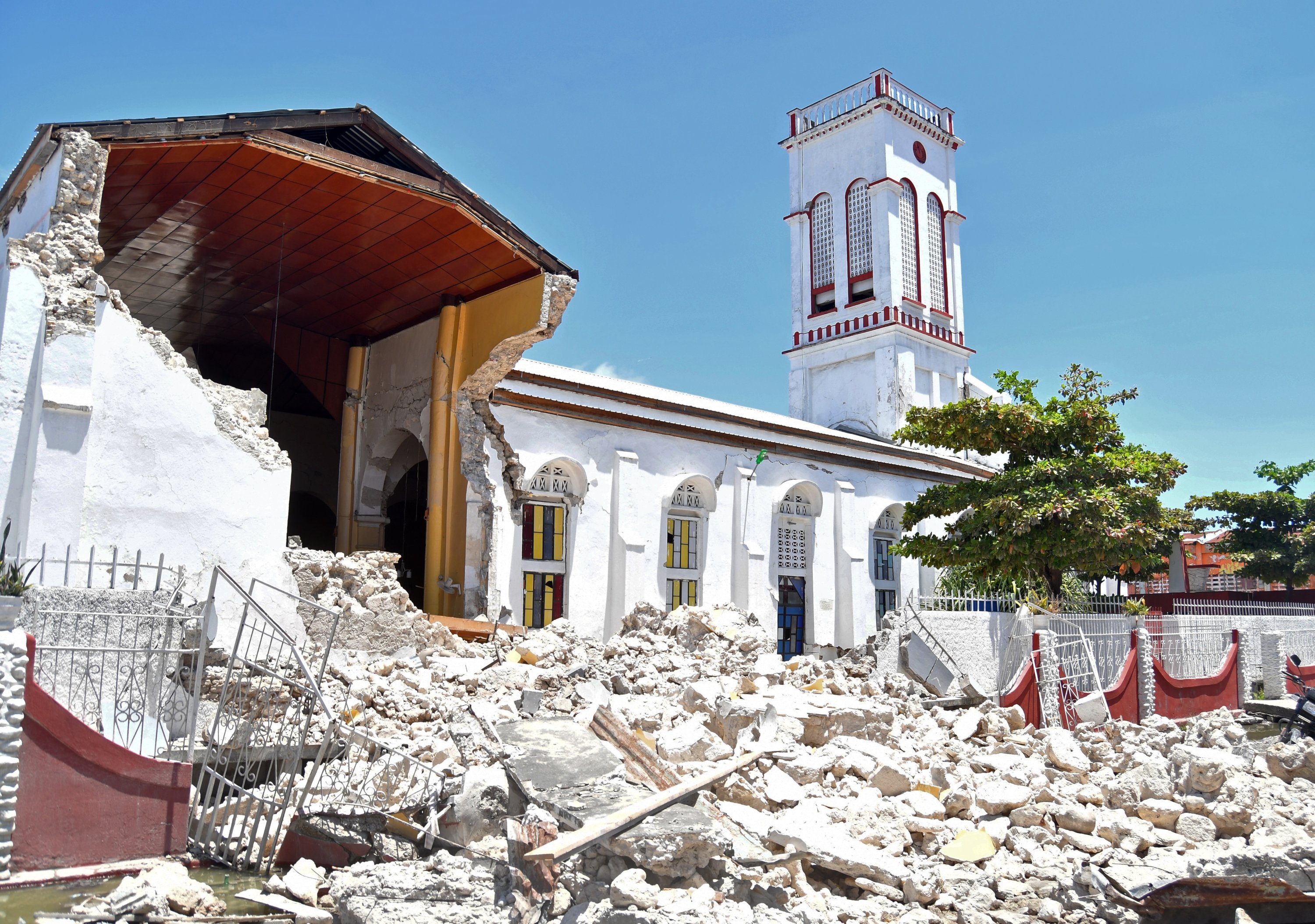© Turkuvaz Haberleşme ve Yayıncılık 2026
The death toll from a magnitude 7.2 earthquake in Haiti soared on Sunday as rescuers raced to find survivors amid the rubble ahead of a potential deluge from an approaching tropical storm.
Saturday's earthquake left at least 724 dead and more than 2,800 injured in the Caribbean island nation, with thousands more displaced from their destroyed or damaged homes.
Survivors in some areas were forced to shelter in streets or soccer fields with the few belongings they were able to salvage from their homes. Yet the devastation could soon worsen with the coming of Tropical Storm Grace, which was predicted to reach Haiti late Monday or early Tuesday, bringing the potential for torrential rain, flooding and landslides.
The U.S. National Hurricane Center forecast 4 to 8 inches (10 to 20 centimeters) of rain in Haiti and the Dominican Republic, with up to 15 inches in some southern parts of the island they share.
The earthquake struck the southwestern part of the hemisphere’s poorest nation, almost razing some towns and triggering landslides that hampered rescue efforts. The disaster added to the plight of Haitians who were already grappling with the coronavirus pandemic, a presidential assassination and a wave of gang violence.
The epicenter of the quake was about 125 kilometers (78 miles) west of the capital of Port-au-Prince, the U.S. Geological Survey (USGS) said. Aftershocks continued jolting the area Sunday.
In the badly damaged coastal town of Les Cayes, some families salvaged their few belongings and spent the night at an open-air football pitch. On Sunday morning, people lined up to buy what little was available: bananas, avocados and water at a local street market.
Some in the town praised God for surviving the earthquake, and many went to the city's cathedral, which appeared outwardly undamaged even if the priests' residence was destroyed. "We only have Jesus now," said Johanne Dorcely, 58, whose house was destroyed. "If it wasn’t for Jesus, I wouldn’t be able to be here today."
Prime Minister Ariel Henry declared a one-month state of emergency for the whole country and said he was rushing aid to areas where towns were destroyed and hospitals overwhelmed with patients.
A former senator rented a private airplane to move injured people from Les Cayes to Port-au-Prince for medical assistance. "The most important thing is to recover as many survivors as possible under the rubble,” said Henry.

"We have learned that the local hospitals, in particular that of Les Cayes, are overwhelmed with wounded, fractured people.” Sunday's count from Haiti’s Office of Civil Protection raised the previous death toll from 304 dead. The agency said more than 7,000 homes were destroyed and nearly 5,000 damaged.
Hospitals, schools, offices and churches were also affected. People in Les Cayes tried to pull guests from the rubble of a collapsed hotel, but as the sun set on Saturday, they had only been able to recover the body of a 7-year-old girl whose home was behind the facility.
"I have eight kids, and I was looking for the last one,” Jean-Claude Daniel said through tears. "I will never see her again alive. The earthquake destroyed my life. It took a child away from me.”
Hospitals were overwhelmed at a moment when Haiti has been struggling with the pandemic and a lack of resources to deal with it. The country of 11 million people received its first batch of U.S.-donated coronavirus vaccines only last month via a United Nations program for low-income countries.
The earthquake also struck just over a month after President Jovenel Moïse was shot to death in his home, sending the country into political chaos. His widow, Martine Moïse, who was seriously wounded in the attack, posted a message on Twitter calling for unity among Haitians: "Let’s put our shoulders together to bring solidarity.”
As he boarded a plane bound for Les Cayes, Henry said he wanted "structured solidarity” to ensure the response was coordinated to avoid the confusion that followed the devastating 2010 earthquake, when aid was slow to reach residents after as many as 300,000 Haitians were killed. U.S. President Joe Biden authorized an immediate response, calling the United State a "close and enduring friend to the people of Haiti.”
He named USAID Administrator Samantha Power to oversee the U.S effort to help Haiti. Power announced Sunday that USAID was sending a search and rescue team from Virginia at the request of Haiti's government.
The 65-person team will bring specialized tools and medical supplies to assist with the disaster response, Power said on Twitter. Working with USAID, the U.S. Coast Guard said a helicopter was transporting medical personnel from the Haitian capital to the quake zone and evacuating the injured back to Port-au-Prince.
"For now, the Coast Guard is working where the most urgent need is,” said Lt. Commander Jason Nieman, a spokesperson. Another helicopter was being sent from the Bahamas, along with other aircraft and ships, Nieman added. Argentina and Chile also were among the first nations to promise help.
The North Carolina-based aid group Samaritan’s Purse announced Sunday it would airlift 13 disaster response specialists and 31 tons of emergency supplies to Haiti. Those include shelter materials and water filtration units. Humanitarian workers said gang activity in the seaside district of Martissant, just west of the Haitian capital, also was complicating relief efforts.
"Nobody can travel through the area,” Ndiaga Seck, a UNICEF spokesman in Port-au-Prince, said by phone. "We can only fly over or take another route.”
Seck said information about deaths and damage was slow coming to Port-au-Prince because of spotty internet service, but UNICEF planned to send medical supplies to two hospitals in the south, in Les Cayes and Jeremie. Haiti, where many live in tenuous circumstances, is vulnerable to earthquakes and hurricanes. A magnitude 5.9 earthquake in 2018 killed more than a dozen people.
